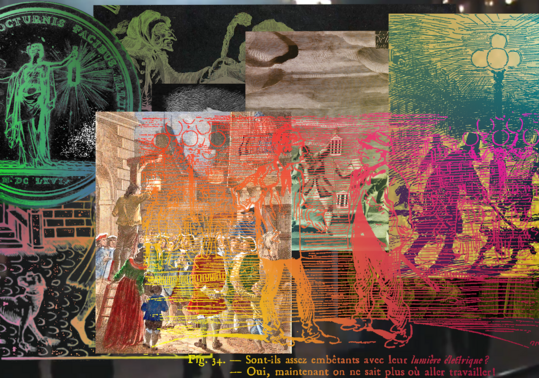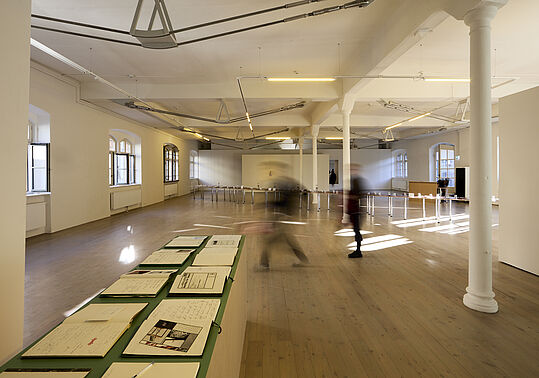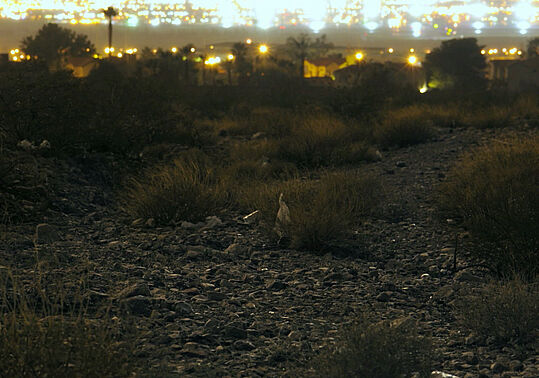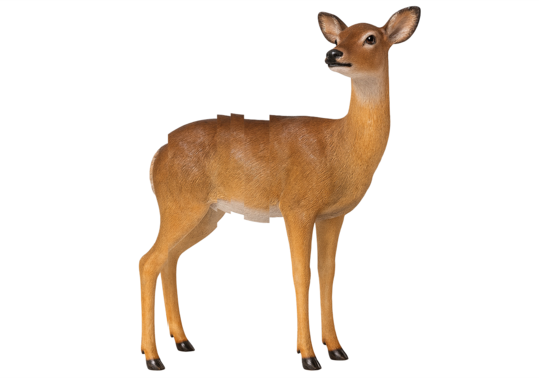
6.10. – 25.10.2023
Projektraum
open floor
open floor is an exhibition project by Natalia Gurova, Rafael Lippuner, and adO/Aptive (Janina Weißengruber, Daniel Hüttler) that invites six collectives to lay out a common ground, a field on which various practices converge and coalesce in a shared room: Tratado Material, TECHNOPOLITICS, AUSLÄNDER, Danube Transformation Agency for Agency, Office Ukraine, and MŰTŐ.
During the show and discursive events, each will reflect on their modes of cooperation – how objects, knowledge, feelings, and experiences are shared within them and with an audience. An intervention on the floor of VERSUCHSANSTALT shall open the exhibition towards a discourse on its industrial past, generate connections between the artistic positions, and invite visitors to abide and enter into dialogue.
Participating collectives:
AUSLÄNDER
Danube Transformation Agency for Agency
MŰTŐ
Office Ukraine
TECHNOPOLITICS
Tratado Material
With friendly support by:
Kultur im 9. - Alsergrund
Academy of Fine Arts Vienna
Due to the WUK renovation, concerts, performances, exhibitions and children's theatre can temporarily not take place at their usual venues. Under the title "VERSUCHSANSTALT" Kunsthalle Exnergasse, Musik, performing arts and KinderKultur curate the program in the newly renovated project space and interweave their topics and formats in a spatial and content-related juxtaposition and togetherness.
Presstext
"open floor: practice of a common ground" is an exhibition project inviting six collectives working in and around Vienna to establish a literal common ground, on which various practices converge and coalesce in a shared space. Tratado Material, TECHNOPOLITICS, AUSLÄNDER, Danube Transformation Agency for Agency, Office Ukraine, and MŰTŐ: we invited these six collectives comprising individuals from various backgrounds to lay out a segment of "open floor", a common ground or field of various practices that converge and coalesce into a mutual, shared experience. During the show and discussion events, each collective will reflect on their modes of cooperation – how objects, knowledge, feelings, and experiences are shared among them and with an audience. The intervention on the floor of VERSUCHSANSTALT is intended to provoke a discussion of the venue’s industrial past, generate connections between artistic positions, and invite visitors to engage and enter into dialogue with the presented works.
building groups to make art
"open floor" is an exhibition project that emerged out of an interest in presenting modes of collective art creation. As the general understanding and validation of contemporary art is (currently) shifting and moving towards a political (and social) questioning of the conditions of art production, as well as a more general question of what art as a practice aims and should aim for; has the discipline become something that should somehow continue to value reflecting on itself as an ethical imperative?
The figure of the solitary creative generating ideas inside a single brain and studio space has been debated and questioned by art critics and also practitioners themselves, who present and propose an alternative to this myth.
it matters what matters matter
"open floor" is about assembling this kind of work and displaying it in a setting that navigates between different conceptions of the spaces a group show is capable of opening up. It is to be a break from the hermetic structures that commonly define exhibition-making. The exhibition focuses on the practices behind art production because showcasing art as a finalized product or even a state of affairs often neglects the radical potential art has as an epistemological mediator.
The exhibition display is not only a clearly defined plane where various practices share the space, but also creates tension between the different components – between work, ephemeral, and historic elements. This dialogue between the art, the stage, the floor, and the setting enters the discursive dimensions of infrastructure, path dependency, the attention economy, and many others addressed by the collective practices. The common (carpet) ground is separated from the historic wooden floor, creating the general expectation that everything on the elevated stage deserves more attention.
In order to disrupt these dynamics, visitors can for example enter the elevated stage that hosts Office Ukraine. By showing and accentuating the layers needed to find a zone of mutual understanding, we wish to subtly critique the formal-aesthetics driven contemporary art found in many exhibitions.
the floor is lava
In the vein of the tradition of the exhibition space VERSUCHSANSTALT, "open floor" calls for collective experimentation, conversation, and lingering in a space that several decades ago was an experimental workstation located on a pre-industrial wooden floor of a technical school. Visitors shall be encouraged to not only engage with the collective practices of each group involved but also to direct their attention toward this floor steeped in history. Take off your shoes and enter a path that leads you through a carpet-framed structure configured by the historical idiosyncracies of the floor itself.
Text: adO/Aptive
Participating Collective:
Ausländer collective was established in 2018 in Vienna by people from different cultural backgrounds interested in self-organization strategies in social, cultural, and political contexts based on mutualism and linear relationships. Engaged in art and activism, Ausländer creates performative strategies for facilitating public space discussion of environmental transformations. The collective structure functions as a platform for creative collaborations with individuals and other collectives.
For "open floor: practice of a common ground",Ausländer created the work "Aesthetics of the Solar Land", which presents several tactics as actions for addressing the public sphere as a “solar land”. Ambivalent poetic visuals and narratives as banner statements introduce a dialog on power relations in geopolitics, and planetary economies as constructs of society. Intervening in public space generates an ambiguous field of visibility charged with contradictory experiences, where the interpreters turn the message into their struggle. By shapeshifting the content, the idea emerges as a commentary on cultural critique and its resources. The performative aspect considers sound as a means for consolidation in reclaiming the territory where the audience expands in a musical demonstration.
For the closing event, Ausländer collective will present an experimental punk and anti-art performance that embraces a sociocultural critique on class, gender, and race privileges within society.
Tratado Material (Material Treaty) are Frida Robles (MX), Oscar Cueto (MX), and Ramiro Wong (PE). The Vienna-based collective creates containers for exhibiting the works of other artists. Their projects aim to strengthen relationships and connections between artists beyond their material production, reflecting on the objectivity of art and its consumption, and taking particular interest in art-market speculation and representation politics.
"Tratado Material III: Soup d’artiste" [Pool of Artists]
Tratado Material III’s central question is: How to handle the intangible?. With a portable pool filled with water – installed inside the exhibition space – the collective will introduce a performative discussion. The pool of artists will be celebrated on the opening evening, during which Tratado Material will introduce warm water, salt, and herbs into the pool and serve drinks to the artists. The water is the byproduct, it will remain stagnant during the exhibition, collecting and brewing the artists’ corporeal and evanescent traces. As a closing event, the collective will bottle, label, and sell the “Soup d’artiste [Pool of Artists]” to the audience. Afterwards, the product will be sold online via eBay, Amazon, and Willhaben.
The Danube Transformation Agency for Agency (DTAFA) is an ecofeminist art and design collective dedicated to providing services and mediations between species. DTAFA’s practices and projects move between ecology, technology, and activism with the aim to explore more equitable ways of living together. Whether through fish-friendly swimming courses or a trans-species partnership with a Chinese pond mussel, the agency employs experimental interventions as a method to develop tools for socio-ecological innovation and empowerment.
As part of "open floor: practice of a common ground", DTAFA will initiate their negotiation process on the unresolved questions, recurring ambivalences, and impending uncertainties facing art collectives when creating a common breeding ground for future endeavors.
They ask and seek to answer the following questions:
When is the right moment to formalize the informal? What does it take to become a legal entity to advocate not only for the rights and well-being of humans but also other non-human, living beings? How can our artistic practice not only address but empower these concerns? Can we accomplish our mission of creating safe spaces of belonging, not only within our projects, but also in the way we treat one another?
Acknowledging the intrinsic value and interconnectedness of all living beings and the environment requires balancing contrasting interests in creative ways. Nurturing a collective necessitates an equally compassionate approach to governance and decision-making.
The audience is invited to participate in the members’ process to become absorbed by a more-than-artist, more-than-individual, more-than-human entity – DTAFA – a legal body formalized not just to survive, but to thrive!
MŰTŐ is an artist-run independent platform and collective founded in 2016 in Budapest. Its mission is to create a space for young artists to find new ways of creation. Its community builds upon critical curatorial practices and the democratic ideas of DIY culture. The group has organized, in close collaboration with Hungarian and international artists, more than forty exhibitions and thirty music performances over the years.
MŰTŐ’s artistic practice experiments with new ways of working together as a collective. The members of the collective reflect on the topic of "sharing" with a consistent methodology that also creates room for playfulness, and seeks to reinforce the diasporic communities to survive. Since half of the members of the group have started a new life abroad, they decided to create a multimedia Chimera,built up from individual artworks connected at several points. The pieces investigate the cultural and personal circumstances and experiences that allow for the development of a sustainable network without an exact location. MŰTŐ presents a digital space that helps to experience the working method of its community.
Office Ukraine. Shelter for Ukrainian Artists was established shortly after the beginning of the war for Ukrainian artists and cultural workers in all disciplines seeking shelter in Austria. It serves as a liaison between them and the Austrian art scene.
All persons, initiatives, and institutions who want to express their solidarity with and support for Ukrainian artists and the artistic field during this war are invited to get involved with Office Ukraine and will be networked with like-minded others here. Office Ukraine has been created in cooperation with civil society, the BMKÖS, tranzit.at, the BMEIA, < rotor >, Künstlerhaus Büchsenhausen, springerin, and other initiatives.
For the exhibition, members of the initiative would like to bring one part of Office Ukraine to Kunsthalle Exnergasse and display their work in an office setting. The Office’s entire structure was established soon after Russia started its invasion in 2022. So far, the Office has been in touch with more than 1,000 artists and cultural workers from Ukraine currently based in Austria. Office Ukraine exists both on- and offline, with a space where people can drop by for advice. People who need help can fill out a form on the website, cultural workers who are ready to help can offer it the same way. Office Ukraine has worked together with roughly 200 institutions, organized numerous events, exhibitions, talks, screenings etc. In addition to the display, the Office will put out an open call for works showcasing selected Ukrainian artists: Tanya Sthykalo and Olia Blagovcurrently residing in Austria and also organize an artist talk during "open floor: practice of a common ground".
TECHNOPOLITICS is an independent, transdisciplinary platform of artists, journalists, researchers, designers, and developers who jointly develop innovative formats at the intersection of art, research, science, and pedagogy. Technopolitics was launched by Armin Medosch and Brian Holmes in 2009. Since then, we investigate large-scale historical processes structured by technoeconomic paradigms from a critical, explorative standpoint and use transdisciplinary approaches to connect these processes to the cultural forms of the respective historical moment and place.
TECHNOPOLITICS working group: John Barker, writer | Emma Dowling, sociologist, political scientist | Sylvia Eckermann, artist | Doron Goldfarb, computer scientist | Volkmar Klien, artist, composer | Gerald Nestler, artist, writer | Felix Stalder, sociologist, cultural theorist | Axel Stockburger, artist, researcher | Gerald Straub, applied cultural theorist, curator, artist | Thomas Thaler, science journalist | Ina Zwerger, science journalist.
Within the framework of open floor: practice of a common ground, TECHNOPOLITICS presents Timeline Project. The large-scale print comprising 500 dated entries, draws attention to different events and genealogies from the fields of art, culture, media, politics, economy, technology, and social life that have been relevant for the shaping of information society. The project’s objective is to provide a common framework for the participative investigation of techno-economic paradigms in the form of workshops where the timeline is edited and changed by the visitors.
Curatorial team:
adO/Aptive is a Vienna-based collective active around Central Europe; members involved in this project are founder Daniel Hüttler and Janina Weißengruber. It forments critical thinking, potential action, communication and otherness by adopting techniques to situate adaptive processes. In 2019, it first was initiated as a reading group organized at school (Grüngasse 22, Vienna) and has been invited to Wiener Festwochen 2022. Since then, adO/Aptive has organized events such as conferences or workshops and worked on collective art projects at the intersection of performance, theory, and speculation. adO/Aptive is always interested in interdisciplinary exchange and playful approaches to art and theory.
Natalia Gurova’s multidisciplinary practice encompasses sculpture, printmaking, drawing, poetry, site-specific installation, and curating. Working with the overlapping discourses of speculative storytelling, spatial experiments, post-Soviet contexts, time concepts, and collecting, Gurova refuses categorical distinctions. Natalia’s works have been exhibited at Vienna Art Week, Vienna Design Week, Parallel, Austrian Cultural Forum London, Queer Museum at Austrian Museum of Folk Life and Folk Art, Galerie Michaela Stock, Belvedere 21. She has co-curated student shows at Exhibit Studio, the Academy of Fine Arts Vienna and organized projects for Office Ukraine in Vienna.
Rafael Lippuner operates artistically between Situationist happenings, sculpture, and social sculpture. The everyday serves as a starting point for his artistic interventions, incorporating automated movements that are therefore almost invisible. Structures and objects required for routines are adopted and re-inserted into the public, expanding the context of their role. Born in Zofingen/CH, he graduated in 2019 from the University of Applied Arts Vienna. His works have been shown at MAK, Parallel Vienna, Vienna Art Week, and off-spaces; international projects include Belgrade, Lisbon, Kotor, Zürich, and Karlsruhe. In 2022, he received a promotional grant from the Aargauer Kuratorium.
Curatorial Statement
The “open floor” team (Natalia Gurova, Rafael Lippuner, and adO/Aptive), a collaboration dedicated to “practices of a common ground,” condemns the Russian military aggression in Ukraine, a blatant violation of international law. It is imperative that Russia puts an end to this violence and ceases committing further crimes against humanity.
Our exhibition project embodies the principles of solidarity and support and brings together artists from diverse backgrounds. As organizers we explicitly oppose discrimination of any kind and unequivocally reject all forms of aggression, neo-colonialism, and nationalism.
We provide a platform for Ukrainian artists residing in Austria to share their perspectives and collaborate with Office Ukraine, whose mission is to support Ukrainian artists in Austria and serve as a focal point for those who wish to contribute.













